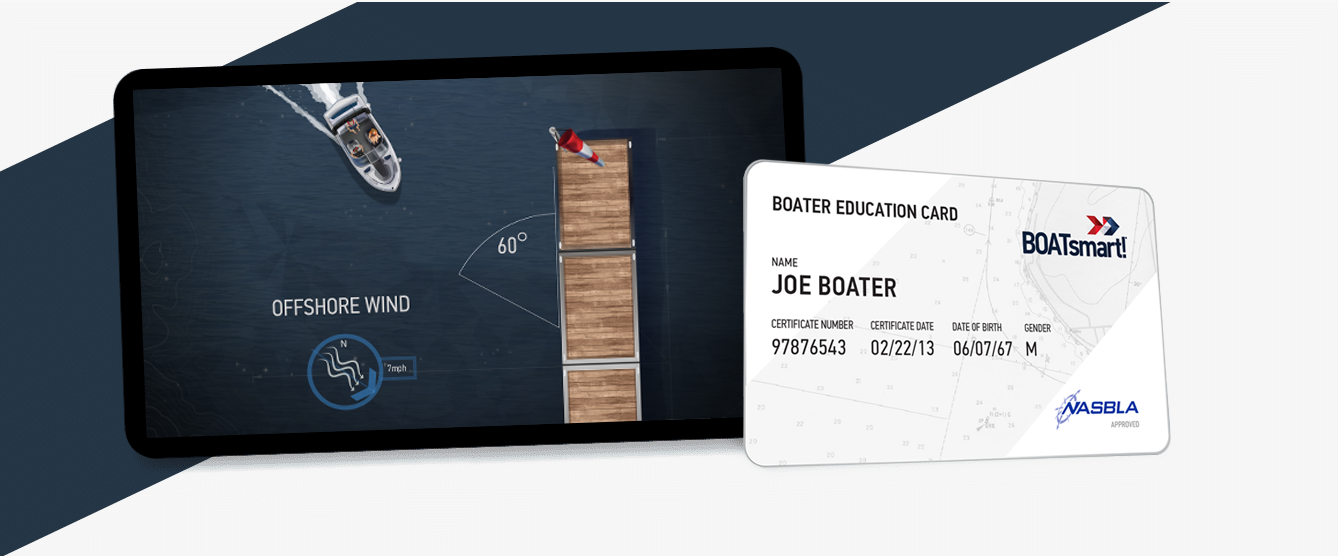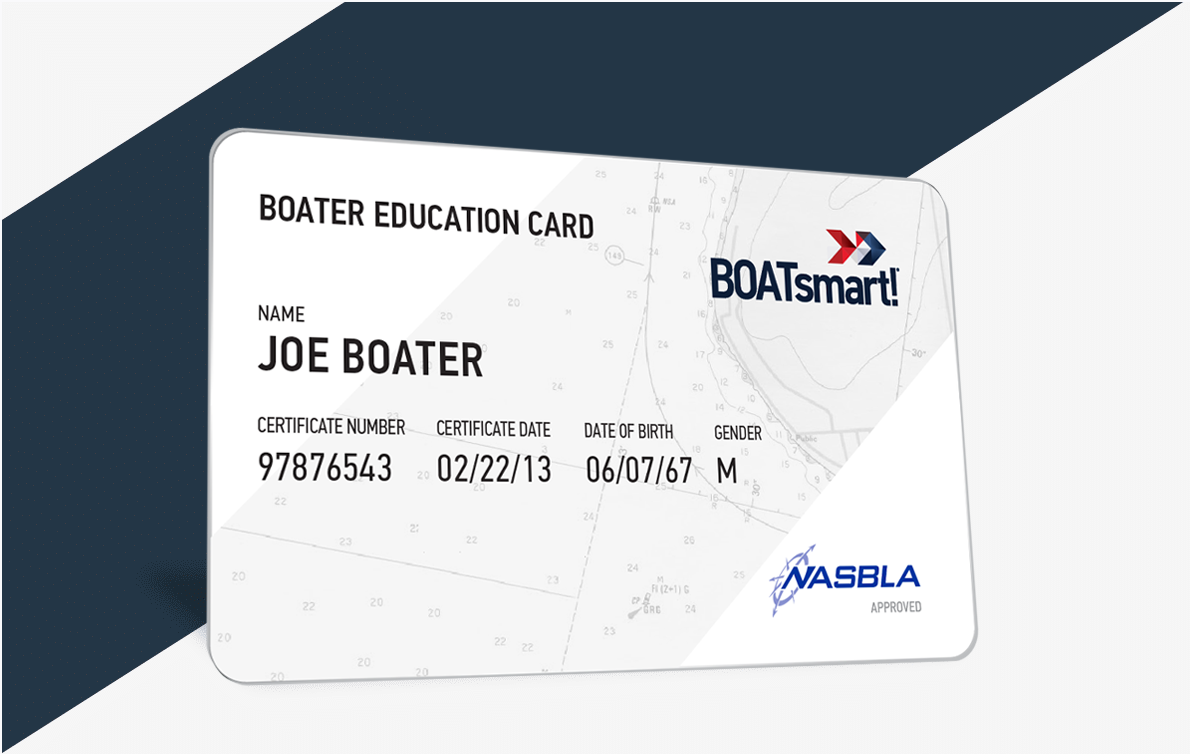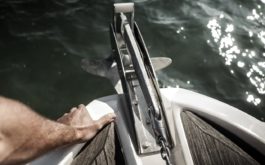Who needs a Boater Education Card in Missouri?
All persons born after January 1, 1984, who wish to operate a boat on Missouri waters are required to carry one of the following on board the boat:
- A Boating Safety Identification Card, commonly called a boat license (from a NASBLA-approved course) issued by the Missouri State Highway Patrol (MSHP).
- A valid master’s, mate’s, or operator’s license issued by the U.S. Coast Guard.
- A Missouri driver’s license, or a non-driver’s license, with a boating safety endorsement issued by the Missouri State Highway Patrol (MSHP).
Exemptions
- Those licensed by the U.S. Coast Guard to serve as master of a vessel.
- Those who operate a boat only on a private lake or pond that is not classified as waters of the state.
- Operators participating in an event or regatta approved by the water patrol.
- Non-residents who have proof of a valid Boating Certificate or license issued by another state (as long as the Boating Course is NASBLA-approved).
- Those exempted by rule of the water patrol.
- Those currently serving in any branch of the United States Armed Forces, reserves, or Missouri National Guard, or any spouse of a person currently in such service.
- Any operator who has previously successfully completed a NASBLA-approved Boating Safety Education Course.
Age and Horsepower Restrictions
It is illegal for any person under 14 years of age to operate any motorized boat or vessel upon the Missouri waters unless they are under the direct, on board supervision of a parent, guardian or other person, who is 16 years of age or older, or unless the motorized boat is moored.
Additionally, it is illegal to allow a person who is under the minimum age to operate a motorized boat while unattended.


Get your Official North American
Boating License
The Official NASBLA and State-Approved Boating Course, Test & License.
Get your Official North American
Boating License
The Official NASBLA and State-Approved Canada Boating
Course, Test & License.
MISSOURI’S LIFE JACKET REQUIREMENTS
Missouri law requires boaters to have a U.S. Coast Guard-approved life jacket on board and accessible for each occupant of the boat. Children under the age of seven are required to wear a life jacket whenever they are on a boat unless they are in the cabin area of a houseboat or cruiser. All personal watercraft users are required to wear life jackets anytime they are underway. The simple act of choosing to wear a life jacket has made a huge difference for many accident survivors.
MISSOURI BOATING LICENSE REQUIREMENTS FOR PERSONAL WATERCRAFT (PWCS)
All operators born after January 1, 1984, must have the Missouri Boating Safety Certification Card to legally operate a motorized vessel or a personal watercraft (PWC) on any Missouri lake. Motorboat or PWC operators must be 14 years of age or older unless under the direct supervision of a person 16 years or older.
MISSOURI’S LAWS FOR CARELESS, NEGLIGENT AND RECKLESS BOAT OPERATION
It is illegal in the state of Missouri to operate any boat, waterskis, wakeboard, or similar device, in a careless, reckless or negligent manner so as to endanger the life, limb or property of any person.
Examples of reckless boat operation may include:
- Operating in a restricted area.
- Disturbing or harassing wildlife.
- Creating a hazardous wake.
- Boating while under the influence.
PENALTIES FOR RECKLESS BOAT OPERATION
- Upon a first conviction, a person will be guilty of a Class B misdemeanor.
- Upon a second conviction, a person will be guilty of a Class A misdemeanor.
- Upon a third or subsequent conviction, a person will be guilty of a Class D felony.
BOAT SPEED LIMITS AND OPERATION IN RESTRICTED AREAS
In Missouri, it is illegal to:
- Operate a boat in any restricted or zoned area.
- Operate at a speed greater than 30 miles per hour (mph) from a half-hour after sunset until an hour before sunrise.
- Operate within 100 feet of any dock, pier, occupied anchored boat or buoyed restricted area on any waterway at a speed in excess of ‘Slow-No Wake’ speed.
BOATING AND ALCOHOL
Missouri law prohibits operating a vessel while intoxicated on drugs or alcohol. However, there are two types of boating while intoxicated (BWI) that carry different penalties:
- Impairment BWI. The prosecution proves an impairment BWI by showing that the boater was actually impaired by the drugs or alcohol ingested.
- Per se BWI. A per se BWI is based on the boater’s blood alcohol concentration (BAC). The offense—which is also called “boating with an excessive blood alcohol concentration”—is defined as operating a vessel with a BAC of .08% or greater.
Missouri BWI penalties also depend on whether the boater has prior convictions and whether the current offense or any of the priors involved injuries or fatalities. Based on these factors, a BWI offender will be classified as:
- a standard first offender
- a prior boating offender
- a persistent boating offender
- an aggravated boating offender
- a chronic boating offender, or
- a habitual boating offender.
So, the type (standard or per se) and the classification (first, prior, persistent, aggravated, chronic, or habitual) of BWI, together, determine the possible consequences of a conviction.
Misdemeanors and Felonies
Missouri crimes are divided into classes of misdemeanors (A through C) and felonies (A through E). Here’s how BWIs are categorized and punished.
- Class B misdemeanor. Punishable by up to six months in jail and a maximum $1,000 in fines.
- Standard first offenders with an impairment or a per se BWI conviction.
- Class A misdemeanor. Punishable by up to one year in jail and a maximum $2,000 in fines.
- Prior boating offenders with an impairment or a per se BWI conviction.
- Standard first offenders with an impairment BWI conviction, where a person less than 17 years of was a passenger in the vessel.
Felony BWIs
- Class E felony. Punishable by up to four years in prison and a maximum $10,000 in fines.
- Persistent boating offenders with an impairment or a per se BWI conviction.
- Standard first offenders with an impairment BWI conviction, where the boat operator acts with criminal negligence and causes injury to another person.
- Class D felony. Punishable by up to seven years in prison and a maximum $10,000 in fines.
- Aggravated boating offenders with an impairment or a per se BWI conviction.
- Standard first offenders with an impairment BWI conviction, where the boat operator acts with criminal negligence and causes injury to a law enforcement officer or emergency personnel.
- Standard first offenders with an impairment BWI conviction, where the boat operator acts with criminal negligence and causes serious injury to another person.
- Class C felony. Punishable by three to ten years in prison and a maximum $10,000 in fines.
- Chronic boating offenders with an impairment or a per se BWI conviction.
- Standard first offenders with an impairment BWI conviction, where the boat operator acts with criminal negligence and causes serious injury to a law enforcement officer or emergency personnel.
- Standard first offenders with an impairment BWI conviction, where the boat operator acts with criminal negligence and causes death to another person.
- Class B felony. Punishable by five to 15 years in prison and fines that aren’t limited to a certain maximum amount.
- Habitual boating offenders with an impairment or a per se BWI conviction.
- Standard first offenders with an impairment BWI conviction, where the boat operator acts with criminal negligence and causes death to a law enforcement officer or emergency personnel.
- Class A felony. Punishable by ten years to life in prison and fines that aren’t limited to a certain maximum amount.
- Habitual boating offenders with an impairment BWI conviction who have been convicted previously as a habitual boating offender.
MISSOURI BOAT ACCIDENT REPORTING REQUIREMENTS
Vessel operators involved in an accident, collision, or other casualty must immediately inform the Missouri State Highway Patrol of the accident.
The operator also must file an accident report with the Missouri State Highway Patrol if:
- A person dies or disappears or…
- An injury occurs causing any person to lose consciousness, require medical treatment, or be disabled for more than 24 hours or…
- Damage to the vessel and other property exceeds $500.
Most reports of accidents must be made within five days of the accident. However, you must file an accident report form within 48 hours if a person dies or is injured as a result of the accident.
It is also the duty of any operator involved in a boating accident to render all necessary aid and assistance, so far as is possible without endangering his or her own passengers or vessel.
An operator will be guilty of leaving the scene of an accident if he or she knows injury or damage has occurred as a result of the accident, but he or she fails to stop and give the other party or a law enforcement officer the following information:
- His or her name and address
- The vessel registration number
- His or her driver’s license number
MISSOURI STATE HIGHWAY PATROL CONTACT INFORMATION
Water Patrol Division
1510 East Elm Street
Jefferson City, MO 65101
Phone: (573) 751-5071
1-800-525-5555 or *55 (Cellular)
Fax: (573) 522-1287
[email protected]









